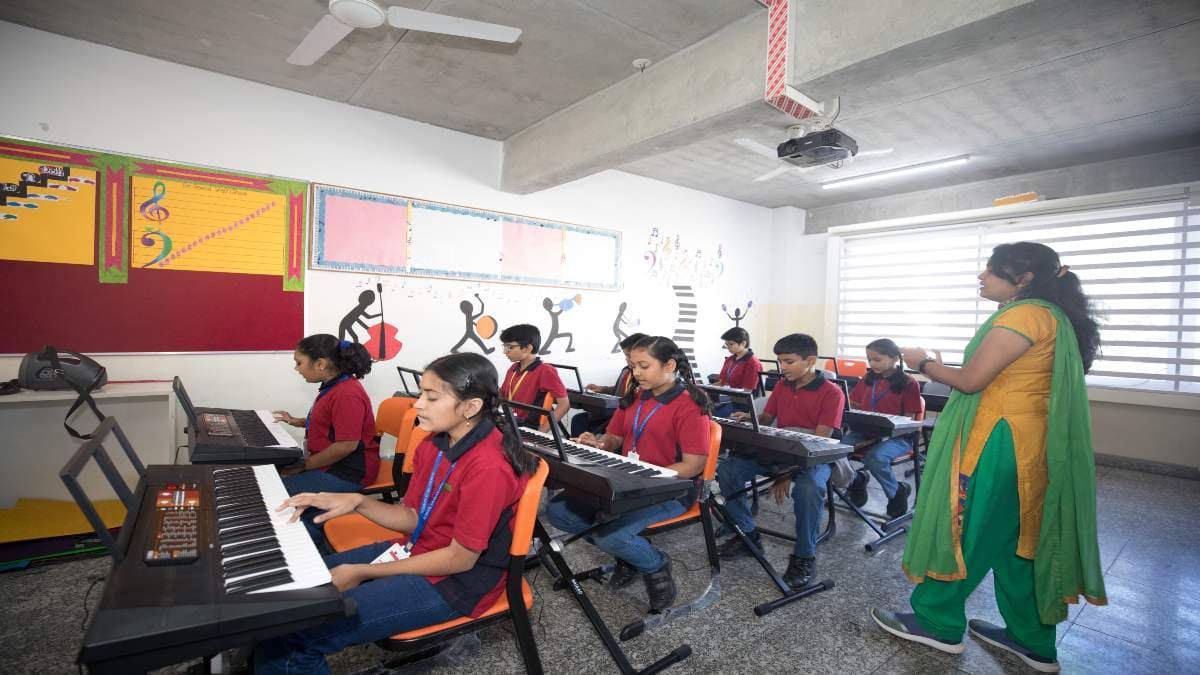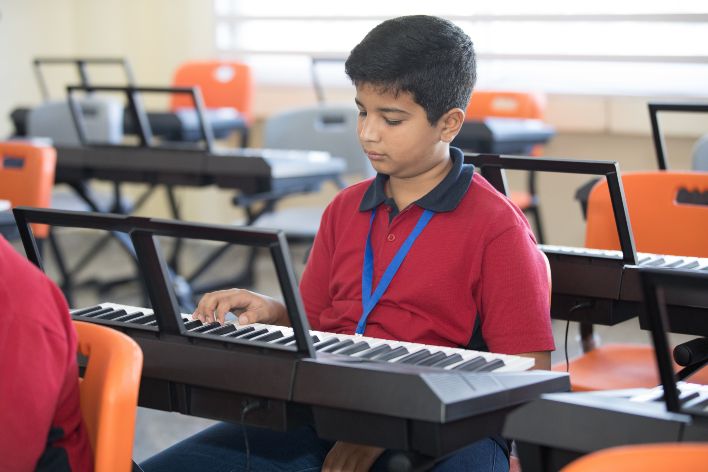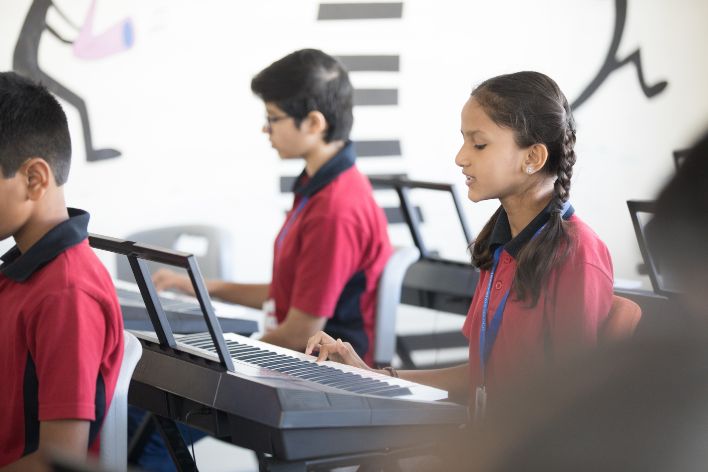What are the Best Ways for Kids to Practice Music?
By Pinkey Sharma |
Date 07-08-2024

Table of Contents
- Why Music Practice is Important:
- Best Way to Practice Music
- Keeping Kids Motivated
- Overcoming Common Challenges:
- The Role of the Music Teacher
- Merits of Group Lessons
- Technology and Music Practice
- Making a Long-Term Music Practice Plan:
- Learning music on a continuous basis:
- Setting out regular time to practice:
- Establish manageable practice times:
- Conclusion:
- Frequently asked questions:
Admissions Open for
Practice in music forms a very integral part of developing music skills. Whether your child is interested in performing classical music or simply in singing pop songs, a good practice routine will help the developing musician to succeed and enjoy his time learning the craft. This is an all-rounded guide on the best ways kids can practice their music, covering classical music practice, music for song practice, creating a music practice plan, and how to set up an effective music practice studio.
Why Music Practice is Important:
Before getting into practical elements, it's good to first understand why regular music practice is important for your child.
Reasons include:
- Skill Development: Music, at par with other skills, requires a lot of consistent hours of work to be skillful in it. Regular practice improves technical skills such as the positioning of fingers and breath control and rhythm.
- Discipline and Patience: Regular practice helps in inculcating discipline and patience among children.
- Improvement of Cognitive Functions: Studies show that music helps in improved concentration and memory among children. Thus helping children in their studies as well.
- Expression of Emotion: With the help of music, children can express their emotions in a beautiful way, expressing their ideas and feelings in the form of music.
Best Way to Practice Music
Establishing Routine
To establish a routine it is necessary to practice regularly. Following are the tips to establish a routine:
• Set a Fixed Time: Set apart time daily to practice only music. This is the way towards habit building and adding it in the regime.
• Start Small: It is often suggested that if one commences music practice, then beginning with short practice is recommended and slowly moving on to practicing longer hours when stamina builds up.
• Consistency Over Duration: This is by far the most crucial aspect where shorter durations of practice every day must be considered rather than a longer type of practice performed once.
Make a Music Practice Schedule
An organized schedule for music practice will guide kids through their practice sessions. They will have goals to work on. This is how you can accomplish it:
• Clear Goals: Decide what needs to be done within a practice session, is it just a matter of learning new pieces, smoothing over difficult sections, or exercises.
• Divide and Conquer: This is the division of the practice time into different sections based on what needs to be done, such as the warm-up section initially, new material, and lastly old material for review.
• Bring variety: Bring in activities that give varied experiences to make the practice sessions interesting. Some of the examples can include ear training, sight reading, and improvisation exercises.

Have a Music Practice Studio
Music practice studios can make the experience of practicing positively different. Some of the following are the reasons;
• Stop Noise: Never practice near noisy areas.
• Proper Equipment: Make sure the child has a good quality instrument with accompanying gadgets such a metronome or sheet music stand available.
• Comfortable Seating: Ergonomics matter and a good chair or bench will lend to proper posture.
• Adequate Lighting: In the best of worlds, good lighting will prevent undue stress on the eyes. If at all possible, natural light is best but a well-placed lamp will suffice.
Encourage Classical Music Practice
It is the basis necessary for most music genres. Here is how to think about it:
• Technique: Very oftentimes, classical music requires precise technique. Incorporate some exercises that help finger strength, agility, or coordination.
• Repertoire: Make sure they are at an appropriate difficulty for a child. Progressively increase the difficulty once his/her skill level starts to rise.
• Listen and Analyze: Play for the child recordings of classical music. Ask for an analysis of the pieces – their structure, dynamics, and emotional content.
Add Music for Song Practice
Practicing songs, especially those the learner likes, can make the practice sessions more interesting. Read the following to know how to utilize song practices to the best:
• Selection of Favourite Songs: Let the child choose songs they would like to learn. This develops a sense of motivation, shifting practice from merely being a duty-oriented activity to an enjoyable one.
• Focusing on the Interpretation: A song practice doesn't only involve playing the correct notes; rather it is also how well one teaches what the song conveys and how he can convey that during his performance.
• Use Backing Tracks: One of the things you could do to make it fun—something that gives them immediate results and makes them feel like a performing musician—is using backing tracks. He'll have more fun, and will be able to hear and try to develop some sense of timing and rhythm.
Keeping Kids Motivated
Keeping the child motivated is connected to actually continuing the practice of the music. Here are the strategies:
Set Achievable Goals
Setting small, achievable goals builds confidence and keeps him motivated. Celebrate his successes to reinforce his progress.
Make Them Enjoy the Practice
Practice sessions involve games and other fun activities. For instance, some music apps have made engaging features that make practice exciting. Let there be a "practice challenge" whereby they get rewards for achieving a certain milestone.
Praise Their Efforts
Positive reinforcement refers to commending the child's effort and improvements made—a little or big, as it may be. Positive reinforcement gives them the urge to continue working hard.
Be Involved
This is greatly influenced by parents' involvement. Take an interest in his progress, attend his performances, and show support, and encouragement.
Overcoming Common Challenges:
Music practice has its set of challenges. Here's how you can overcome some common ones:
Boredom
Mix up the practice routine with different types of activities. Introduce new pieces or genres to keep the interest level high.
Lack of Progress
At times, this might feel like very slow progress. Keep reminding children that it takes time to improve, and with regular practice, he will get there. The setting of small goals will allow them to see the progress.
Frustration
It is natural to get frustrated while beginning to do something. Tell the child to take his time and rest when he needs to, 'work' the hard sections of material very slowly. Tell him it is okay to make mistakes.
The Role of the Music Teacher
A good music teacher makes most of the difference in the child's musical journey. Here is what to look for:
Qualification and Experience:
Ensure that he or she has proper qualifications in teaching an instrument.
Text Style of teaching:
The teaching style should be according to the child's learning style. Some children work better under a structured method, while some others prefer an easy-going free flow concept.
Communication:
Proper interaction between the children, the teacher, and the parents is essential to this method of learning.
Encouragement and Support:
Encouragement and continuous support from the teacher can serve to improve the child's confidence and motivation.

Merits of Group Lessons
Apart from individual lessons, group lessons can also provide some valuable learning. The following are the details:
Peer Learning:
Children can learn from each other and get inspired by the progress of their co-pupils.
Ensemble Skills:
Most of the group lessons involve playing together, hence developing ensemble skills like listening, timing, and coordination.
Social Interaction:
Fortunately, group lessons offer the chance for social interaction and make the idea of practicing music more palatable.
Technology and Music Practice
The extensive reach of modern technology can be utilized effectively in music practice today. A number of these include:
Music Apps
There are plenty of apps available to you which can assist your practice in music. Some have interactive sheet music, some have ear training exercises or rhythm games amongst others.
Online Resources
Online video lessons or tutorial websites can supplement traditional lessons and give additional learning aids.
Record and Playback
Recording practice allows the child to hear his playing back so he can score himself for improvement; it also allows him to see progress over time.
Making a Long-Term Music Practice Plan:
Long-term planning is very important to music because it holds one into continuing appraisal for improvement. Here is how to make a long-term music practice plan:
Make Long-Term Goals
Define what the child hopes to achieve in the long run. It may be learning certain pieces, preparation for exams, or recital performance.
Break Down Goals
Divide long-term goals into small milestones that are achievable. This makes less daunting the overall goal and more clear the path to follow.
Periodic Review
Go through the practice plan from time to time and revise whenever you feel it is necessary. This helps keep everything in the child's practice repertoire fresh and meets the interest of the child.
Learning music on a continuous basis:
The long-term prospect of music practice is making the child develop a lifelong interest in music. It can be done by the following methods:
Cultivating a Healthy Attitude Towards Music
Keep practices positive and enjoyable. Do not put undue pressure on the child to perform, but rather enjoy the process of making music.
Keep Interested in Various Genres
Expose the child to various genres of music to keep their interest alive and broaden their musical horizons.
Support Performance Opportunities
Help the child to take part in recitals, competitions, and all other performance opportunities. Performance gives them a confidence boost-something like, 'Yeah, I did it. I am able to do it.'
Setting out regular time to practice:
The best single practice to help your child practice is to keep a fixed schedule for the music practice. The schedule should not be flexible instead it should be fixed. Dedicated practice should be carried out every time without any gap. Music requires wholehearted commitment from students and also from parents. Full commitment is required to learn music so that your child can become an expert.
Establish manageable practice times:
The children are very busy with the overall schedule as they need to be multitasking with many things like attending school, studying at home, dedicate time for play. Thus the fixed time to be dedicated for the music is also essential. Every day a little time should be dedicated to the music without any gaps, depending on the availability of time.
Rewards:
The children should be appreciated and rewarded for their good performance. Parents can reward their children by giving small gifts for practicing regularly and for attending music classes.
Practice with your child:
The parents can take the initiative to practice with their children so that the group activity along with the parents can help in motivating children to practice regularly.
Play music for your child:
By playing music for your child the children can develop an interest in music and thus can help in motivating them to learn music.
Go to a concert on the weekend:
They also can take their children to concerts on weekends. There are multiple concerts being held in the major cities on streets or malls. Children can find it interesting to attend the concert. And can be motivated to learn music.
Conclusion:
Music practice is a journey. It needs dedication, patience and support. One can help a child develop his/her musical skills and lifelong love for music by teaching how to build up a routine, making a structured music practice plan, and providing them a positive environment that can motivate them. Even if they are learning classical music, songs, or any other types of new genres, the ways described can be very effective in letting them practice time fruitfully and enjoyably. The correct approach can make the practice of music satisfying and enriching for any child.
Frequently asked questions:
How do you get your child to practice music?
The parents should set a timetable for the children and in that they should include the timing for practicing music. This can help children follow a fixed schedule to practice music regularly.
How to encourage kids to play music?
Children should be rewarded for their big or small achievements. Also they should be appreciated for whatever they have learnt and accordingly measures to improvement can also be suggested. Also taking children to concerts can motivate them to learn music.
How should a child be prepared for music?
When kids are exposed to music they can learn musical concepts like rhythm & melody. The children should be offered with the instrument which they desire to have so that they can practice at home.
Share your music experience in the comment section below.
Liked what you read? Feel free to share this article with your friends and spread the knowledge!
Related Blogs
Music for language development: See how music supports children's language skills by improving vocabulary, pronunciation, and communication through fun, engaging activities.
Musical Instruments for Kids: Tips for choosing the right musical instruments for kids
At What Age Should Kids Start Learning Music: Find the best age for children to start music lessons
CBSE Schools In Popular Cities
- CBSE Schools in Bangalore
- CBSE Schools in Mumbai
- CBSE Schools in Pune
- CBSE Schools in Hyderabad
- CBSE Schools in Chennai
- CBSE Schools in Gurgaon
- CBSE Schools in Kolkata
- CBSE Schools in Indore
- CBSE Schools in Sonipat
- CBSE Schools in Delhi
- CBSE Schools in Rohtak
- CBSE Schools in Bhopal
- CBSE Schools in Aurangabad
- CBSE Schools in Jabalpur
- CBSE Schools in Jaipur
- CBSE Schools in Jodhpur
- CBSE Schools in Nagpur
- CBSE Schools in Ahmednagar
- CBSE School In Tumkur

Call Us to know more about Orchids
Swipe Up

















